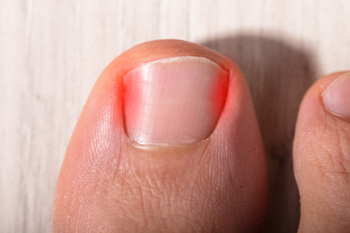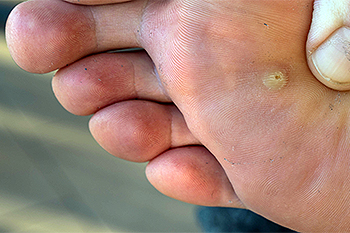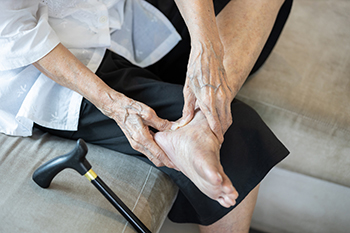Items filtered by date: July 2022
Ingrown Toenail Surgery Pain

Ingrown toenails are a common yet uncomfortable and potentially painful foot condition. This unsightly condition occurs when the side of a toenail essentially grows into the skin. If the toenail is cut too short or if it has a natural curved shape, the nail may be especially prone to growing into the skin. This condition is most common in the big toe. There are a variety of home remedies to treat ingrown toenails. However, if these remedies do not work or if you have multiple ingrown toenails, your podiatrist may recommend undergoing a surgical procedure. This procedure might include removing part of the nail or the entire affected nail. Many patients are curious to know whether or not this procedure is painful. Although each patient’s experience is unique, there is information about this procedure that may be applicable to you. For example, before the surgical procedure, you may need an anesthetic injection that can potentially be uncomfortable for some patients. However, many patients report that the actual procedure following the injection is quite painless. After the procedure, you might experience pain when the numbness slowly abates. To treat this pain following the procedure, you might be able to use over-the-counter medications. If you are curious about the pain you could feel during a surgical procedure to remove an ingrown toenail, speak to your podiatrist.
Ingrown toenails can become painful if they are not treated properly. For more information about ingrown toenails, contact Gary Cockrell, DPM of Tennessee. Our doctor can provide the care you need to keep you pain-free and on your feet.
Ingrown Toenails
Ingrown toenails occur when a toenail grows sideways into the bed of the nail, causing pain, swelling, and possibly infection.
Causes
- Bacterial infections
- Improper nail cutting such as cutting it too short or not straight across
- Trauma to the toe, such as stubbing, which causes the nail to grow back irregularly
- Ill-fitting shoes that bunch the toes too close together
- Genetic predisposition
Prevention
Because ingrown toenails are not something found outside of shoe-wearing cultures, going barefoot as often as possible will decrease the likeliness of developing ingrown toenails. Wearing proper fitting shoes and using proper cutting techniques will also help decrease your risk of developing ingrown toenails.
Treatment
Ingrown toenails are a very treatable foot condition. In minor cases, soaking the affected area in salt or antibacterial soaps will not only help with the ingrown nail itself, but also help prevent any infections from occurring. In more severe cases, surgery is an option. In either case, speaking to your podiatrist about this condition will help you get a better understanding of specific treatment options that are right for you.
If you have any questions please feel free to contact our offices located in Brentwood and Madison, TN . We offer the newest diagnostic and treatment technologies for all your foot and ankle needs.
Treating Plantar Warts With Laser Treatment

Plantar Warts are a troublesome condition that affect the feet. This affliction consists of skin growths that are caused by the contraction of a strain of human papillomavirus (HPV). Since HPV is spread from person to person and thrives in moist environments, people are particularly susceptible to plantar warts when walking barefoot in highly-trafficked public spaces. Plantar warts come in different shapes and sizes but are generally hard and callus-like. There are a variety of ways in which plantar warts can be treated, depending on the severity of the warts. In more extreme cases, a podiatrist might determine that treating the plantar warts with laser treatment is the best course of action. This treatment method involves applying a concentrated beam of light to essentially sear off the wart from the foot. This method of treatment is 60-75% effective in treating plantar warts. However, this treatment also does not come without its risks. Sometimes, this treatment can cause scarring of some kind on the affected area. If you suffer from plantar warts, a podiatrist can help you decide if laser treatment might be a good option for you.
Plantar warts can be very uncomfortable. If you need your feet checked, contact Gary Cockrell, DPM from Tennessee. Our doctor will assist you with all of your foot and ankle needs.
About Plantar Warts
Plantar warts are the result of HPV, or human papillomavirus, getting into open wounds on the feet. They are mostly found on the heels or balls of the feet.
While plantar warts are generally harmless, those experiencing excessive pain or those suffering from diabetes or a compromised immune system require immediate medical care. Plantar warts are easily diagnosed, usually through scraping off a bit of rough skin or by getting a biopsy.
Symptoms
- Lesions on the bottom of your feet, usually rough and grainy
- Hard or thick callused spots
- Wart seeds, which are small clotted blood vessels that look like little black spots
- Pain, discomfort, or tenderness of your feet when walking or standing
Treatment
- Freezing
- Electric tool removal
- Laser Treatment
- Topical Creams (prescription only)
- Over-the-counter medications
To help prevent developing plantar warts, avoid walking barefoot over abrasive surfaces that can cause cuts or wounds for HPV to get into. Avoiding direct contact with other warts, as well as not picking or rubbing existing warts, can help prevent the further spread of plantar warts. However, if you think you have developed plantar warts, speak to your podiatrist. He or she can diagnose the warts on your feet and recommend the appropriate treatment options.
If you have any questions please feel free to contact our offices located in Brentwood and Madison, TN . We offer the newest diagnostic and treatment technologies for all your foot and ankle needs.
Do Your Child's Feet Hurt?
Children and Broken Toes

A broken toe is uncomfortable for the majority of people, and can be discouraging for children who sustain this type of fracture. It is often necessary to refrain from putting pressure on the foot as the healing process occurs, and this may interfere with participating in physical activities. A broken toe can happen if a heavy object falls on it, or if it is jammed against a piece of furniture. Many children notice immediate symptoms that include bruising, swelling, and the inability to walk on the affected foot. Additionally, in severe breaks, the bone may protrude from the skin at an abnormal angle, causing severe pain and discomfort. If you think your child may have broken their toe, a proper diagnosis is necessary. This can consist of having an X-ray or MRI taken. For mild breaks, buddy taping can be an effective form of treatment. This is done by taping the broken toe to the toe next to it, providing the stability needed for complete healing. A broken toe can be treated by a podiatrist who can effectively diagnose and monitor this type of injury.
A broken toe can be very painful and lead to complications if not properly fixed. If you have any concerns about your feet, contact Gary Cockrell, DPM from Tennessee. Our doctor will treat your foot and ankle needs.
What to Know About a Broken Toe
Although most people try to avoid foot trauma such as banging, stubbing, or dropping heavy objects on their feet, the unfortunate fact is that it is a common occurrence. Given the fact that toes are positioned in front of the feet, they typically sustain the brunt of such trauma. When trauma occurs to a toe, the result can be a painful break (fracture).
Symptoms of a Broken Toe
- Throbbing pain
- Swelling
- Bruising on the skin and toenail
- The inability to move the toe
- Toe appears crooked or disfigured
- Tingling or numbness in the toe
Generally, it is best to stay off of the injured toe with the affected foot elevated.
Severe toe fractures may be treated with a splint, cast, and in some cases, minor surgery. Due to its position and the pressure it endures with daily activity, future complications can occur if the big toe is not properly treated.
If you have any questions please feel free to contact our offices located in Brentwood and Madison, TN . We offer the newest diagnostic and treatment technologies for all your foot and ankle needs.
Footwear Choices Are a Critical Component of Elderly Foot Care
 As an individual ages, the extent to which they should be taking steps to care for their feet often increases. This is partly due to the fact that senior citizens become increasingly susceptible to dangerous falls as they age, and healthy feet may help prevent these incidents. A critical component of elderly foot care is choosing the right shoe. For example, certain types of footwear that offer strong backs and low heels are ideal for seniors looking to increase their stability and avert hazardous falls. Shoes that can be snugly fastened to the foot with laces or Velcro can also increase the senior’s stability when standing and walking. When shoe shopping, senior citizens might find it useful to avoid footwear with especially high heels, as these kinds of shoes can make balancing more challenging. Ultimately, the right kind of footwear for seniors will have a sturdy and steady grip on the ground. Elderly foot care is certainly multi-faceted and ever-changing, but selecting the right kind of footwear is one simple yet critical step a senior can take to improve the health of their feet. Contacting a podiatrist may help you learn more ways in which elderly foot care can help you or those you care for have a safe, healthy life.
As an individual ages, the extent to which they should be taking steps to care for their feet often increases. This is partly due to the fact that senior citizens become increasingly susceptible to dangerous falls as they age, and healthy feet may help prevent these incidents. A critical component of elderly foot care is choosing the right shoe. For example, certain types of footwear that offer strong backs and low heels are ideal for seniors looking to increase their stability and avert hazardous falls. Shoes that can be snugly fastened to the foot with laces or Velcro can also increase the senior’s stability when standing and walking. When shoe shopping, senior citizens might find it useful to avoid footwear with especially high heels, as these kinds of shoes can make balancing more challenging. Ultimately, the right kind of footwear for seniors will have a sturdy and steady grip on the ground. Elderly foot care is certainly multi-faceted and ever-changing, but selecting the right kind of footwear is one simple yet critical step a senior can take to improve the health of their feet. Contacting a podiatrist may help you learn more ways in which elderly foot care can help you or those you care for have a safe, healthy life.
Proper foot care is something many older adults forget to consider. If you have any concerns about your feet and ankles, contact Gary Cockrell, DPM from Tennessee. Our doctor can provide the care you need to keep you pain-free and on your feet.
The Elderly and Their Feet
As we age we start to notice many changes in our body, but the elder population may not notice them right away. Medical conditions may prevent the elderly to take notice of their foot health right away. Poor vision is a lead contributor to not taking action for the elderly.
Common Conditions
- Neuropathy – can reduce feeling in the feet and can hide many life-threatening medical conditions.
- Reduced flexibility – prevents the ability of proper toenail trimming, and foot cleaning. If left untreated, it may lead to further medical issues.
- Foot sores – amongst the older population can be serious before they are discovered. Some of the problematic conditions they may face are:
- Gouging toenails affecting nearby toe
- Shoes that don’t fit properly
- Pressure sores
- Loss of circulation in legs & feet
- Edema & swelling of feet and ankles
Susceptible Infections
Diabetes and poor circulation can cause general loss of sensitivity over the years, turning a simple cut into a serious issue.
If you have any questions please feel free to contact our offices located in Brentwood and Madison, TN . We offer the newest diagnostic and treatment technologies for all your foot and ankle needs.


